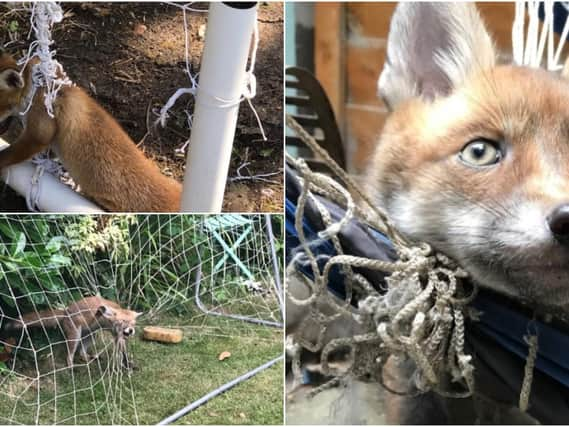Soaring numbers of animals risk entanglement in Euros-inspired footie nets this year, warns RSPCA


As footie-mad sports fans put up football nets in the back gardens and sports fields of England and Wales, the RSPCA has already received more reports about dangerously entangled foxes and other wild animals than this time last year.
With the RSPCA taking 1,139 calls about animals entangled in sports, garden and deterrence netting already this year, numbers have already overtaken 2020’s 1,127 calls for the same period.
Advertisement
Hide AdAdvertisement
Hide AdIn just three weeks in June this year, the animal charity had already received at least 30 netting entanglement reports, 20 of which related to foxes or fox cubs and the remainder being other species such as hedgehogs, deer, rabbits and birds such as gulls and crows.
RSPCA Scientific Officer Evie Button said: “Football and other types of netting may be fun for humans but can be very dangerous for wild animals if they are left out overnight. The RSPCA receives hundreds of calls every year to rescue animals - often wildlife - who have become tangled in netting on sporting equipment or garden nets.
“Already this year, the number of call-outs to rescue animals caught up in nets are up on 2020 and in the past couple of months, we have had a spate of young foxes in particular becoming entangled.
"We suspect that people’s enthusiasm for Euro 2020 may have inspired increased numbers of amateur football nets to be put up in gardens and sports fields around the country and young, curious foxes are unaware of the dangers
Advertisement
Hide AdAdvertisement
Hide Ad“Getting tangled up in netting is very stressful for an animal, particularly one that’s wild. And if the animal gets seriously entangled, netting - whether it’s used for sports, fencing or the garden - can cause severe injuries or even death.
“As wild animals frequently get trapped during the night, they may have been struggling for many hours by the time they are found in the morning and often need veterinary attention and sedation to cut them free.
“It's great that the likes of Jack Grealish and Gareth Bale are inspiring many of us to put on our shooting boots this summer - and enjoy the great outdoors and nature while having a kick-around.
"But we would urge those using sports netting to remove and store all nets after their game and put any discarded or old netting safely in a bin. Any garden fence netting should be replaced with solid metal mesh and use wood panels as fencing instead of netting.”
Advertisement
Hide AdAdvertisement
Hide AdOf the 503 incidents reported to the RSPCA about wild mammals tangled in netting in 2020, 223 were related to foxes, 155 were hedgehogs and 104 deer.
Recent case studies the RSPCA has been called out to rescue include:
A juvenile fox rescued by the RSPCA after getting caught by his neck and leg in football netting in a garden.
A “fox in the box” scored an own goal - after getting caught in football goal netting in a back garden.
Advertisement
Hide AdAdvertisement
Hide AdA not-so cunning fox had to be rescued by the RSPCA after she was found trapped in some football netting which almost strangled her.
To report concerns about an animal, call the RSPCA’s emergency line on 0300 1234 999 or visit the website www.rspca.org.uk/adviceandwelfare/wildlife/injuredanimals.Please do not try to free the animal from the netting yourself, as animals can have serious injuries if they become tightly entangled, so it’s best that they are examined to check if they need veterinary treatment before being released.
To help the RSPCA continue rescuing, rehabilitating and rehoming animals in desperate need of care please visit the website or call our donation line on 0300 123 8181.